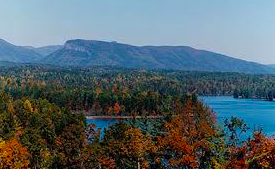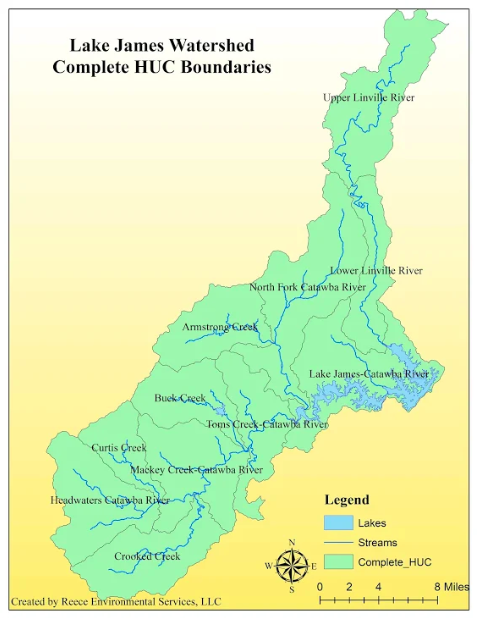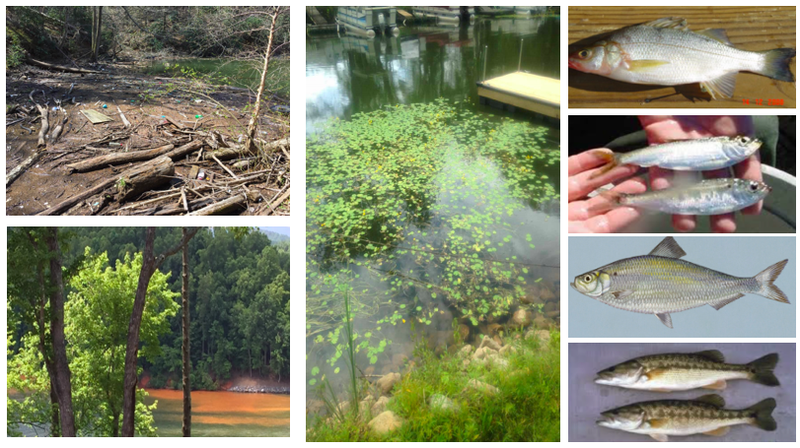2018 State of the Lake James Watershed
Executive Summary

The Lake James Environmental Association was founded in 1973. For 46 years, the association has focused on protecting the Lake James watershed, which contains some of the most pristine waters in the Southeast. It is an asset to the area worth preserving. As development and industry in the area continue to grow, the importance of that preservation is becoming increasingly apparent. Millions of people downstream from the watershed depend on the water that makes its way through Lake James’ dams and, in the near future, the lake will become a source for drinking water in McDowell County. At the same time, increased development in the watershed is a driving factor in increased erosion, sedimentation, trash, boat traffic, and potential for pollution that will impact this important resource. In 2018, the Lake James Environmental Association embarked on the initiative to pull together this State of the Watershed Report to help identify what issues truly are or are not threats at this time and incorporate the findings into a ten year strategy. Lake James Environmental Association will use this Watershed Assessment to identify, seek funding for, and execute projects necessary to keep the Lake James Watershed the beautiful and healthy place it is.
The report is broken into seven different sections, each with its own summary and conclusions. The report includes the following sections:
- Chemical Analysis of Water Quality
- Biological Survey
- Erosion and Sedimentation
- Land Cover Analysis
- Trash Assessment
- State of the Fishery
- Survey of Public Opinion
The data compiled in this report is the result of hundreds of volunteer hours and the efforts of a consortium of Warren Wilson College, University of North Carolina – Asheville, and Appalachian State University professors and students providing support and guidance along the way. The Lake James Environmental Association will update the report as additional data becomes available.

The Lake James watershed is a total of 247,475 acres covering parts of Avery, McDowell and Burke Counties. As of 2011, 83% of the watershed’s acreage is considered forested and benefits from being at the headwaters of the Catawba River. The Environmental Quality Institute’s Volunteer Water Information Network program rates the water quality of Lake James’ major tributaries as “Good” and the average of those tributaries score an 81 out of 100 points. This ranks the waters flowing into Lake James as number 41 out of 146 WNC streams ranked in the program. The Chemical Assessment and Biologic Survey of the Watershed show trends in line with other lakes and streams in Western North Carolina and the watershed is not yet subject to some of the threats seen downstream related to industry and large populations. However, considering the forested nature of our watershed, being considered “good” or “in line with other lakes and streams in Western North Carolina” should not be considered satisfactory and there are deeper areas of concern this report has identified. Trash, primarily flowing from the tributaries in McDowell County, is having an impact on both water quality and the aesthetics of the lake. Increased development is causing erosion and sedimentation along stream and lake banks. The introduction of invasive species is impacting the wildlife and aesthetics of the lake. All of these issues are real and current threats to the watershed.

The efforts necessary to continue to protect the Watershed are going to require significantly more time, money, and focus. This report is the first step of identifying where to start, but it will take a community that begins with individuals and extends to local, state and federal governments, local industry, educational institutions, and other associations to pull together in the same direction. Lake James Environmental Association is ready to lead on those efforts, but it cannot be done without your help.
Let us know if you want to learn more. Help us protect our precious resources for future generations.
Click here to provide feedback or ask questions about the report
Click here to become a member of Lake James Environmental Association
Click here to make a donation to Lake James Environmental Association
*Note: For all the spreadsheets in the report, the option to “open in google sheets” or “download” the data is available.*